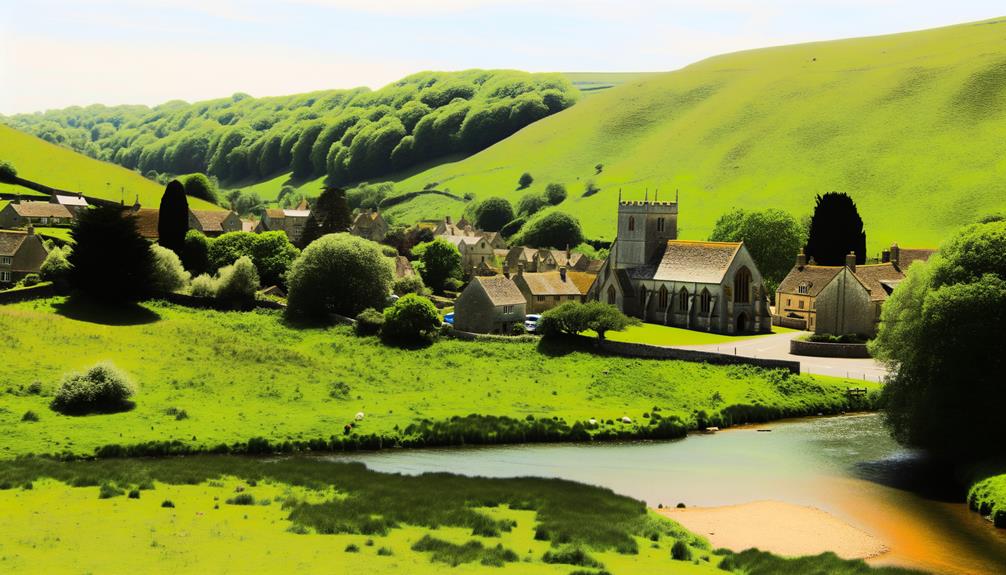Weston Name Meaning and Origin
The name Weston has its origins in Old English, stemming from the terms 'west' and 'tun', which together signify a settlement located to the west. This combination was common in the Anglo-Saxon period, reflecting the agrarian-based society and frontier settlements of that era.
The earliest records of the name appear in the Domesday Book of 1086. Over time, it evolved into both a surname and first name, gaining popularity in the late 19th and early 20th centuries.
Weston conjures images of strength and reliability, often appearing in literature and media. There's much more to understand about its linguistic and cultural journey.

Key Takeaways
- Weston originates from Old English words 'west' and 'tun', meaning a settlement or farm to the west.
- The name has roots in the Anglo-Saxon period and is recorded in the Domesday Book of 1086.
- Initially a surname, Weston gained popularity as a first name in the late 19th century.
- Variations like Westin and Westyn reflect linguistic shifts and cultural adaptations.
- Known for its strong, approachable sound, Weston symbolizes strength and reliability.
Historical Roots
The name Weston, historically rooted in Old English, originates from the combination of 'west,' meaning west, and 'tun,' referring to a settlement or enclosure, indicating a geographical designation for settlements located to the west.
This nomenclature was common during the Anglo-Saxon period, reflecting the spatial organization of communities. Archaeological findings suggest that these settlements were typically established on western frontiers or boundaries of larger estates.
The use of 'Weston' in place names can be traced back to the Domesday Book of 1086, where numerous Westons were recorded across England. This historical context underscores the name's significance in delineating land and establishing territorial identity, providing insight into the socio-political landscape of medieval England.
Linguistic Breakdown
The name 'Weston' originates from Old English, combining 'west,' meaning 'west,' and 'tun,' meaning 'enclosure' or 'settlement,' indicating a western settlement.
Historical records reveal the name's use as early as the Domesday Book in 1086, reflecting its deep roots in the Anglo-Saxon period.
In modern times, variations such as 'Westen' and 'Westin' have emerged, showcasing the name's linguistic evolution and widespread adaptation.
Etymology and Historical Roots
Rooted in Old English, the name 'Weston' derives from the combination of 'west,' meaning 'western,' and 'tun,' signifying a settlement or enclosure. This etymology traces back to the Anglo-Saxon period, indicating a locality situated to the west of a principal settlement.
Historical records from the Domesday Book of 1086 frequently mention Weston as a place name, underscoring its usage in medieval England. The prevalence of this nomenclature is attributed to the agrarian-based society where directional and geographical identifiers were essential. Moreover, this compound naming convention aligns with other Old English place names, revealing a broader linguistic pattern.
The name 'Weston' encapsulates a rich historical context, reflecting the geographical and social structures of early English communities.
Modern Usage and Variations
In contemporary times, the name 'Weston' has evolved into a popular given name and surname, exhibiting variations across different cultures and languages. This evolution reflects broader trends of globalization and cultural exchange, leading to diverse adaptations.
Significantly, 'Weston' has seen increased usage in English-speaking countries, often associated with a sense of tradition and modernity.
- In the United States: Frequently used as a first name, ranking within the top 200 names for boys.
- In the United Kingdom: Mainly a surname, maintaining historical roots.
- In Scandinavian countries: Often adapted as 'Vestun,' reflecting regional linguistic patterns.
- In Spanish-speaking regions: Occasionally transformed to 'Oeste,' aligning with native phonetic structures.
These variations underscore the dynamic nature of linguistic adaptation and cultural integration.
Old English Influence
Drawing from its etymological roots, the name Weston originates from Old English, where 'west' and 'tun' (meaning settlement or enclosure) combine to denote a western settlement. This nomenclature reflects the Anglo-Saxon propensity for descriptive place names, often indicating geographical features or locations relative to cardinal directions.
The Old English language, which flourished from roughly the 5th to the 11th centuries, profoundly influenced modern English, particularly in naming conventions. Weston exemplifies this linguistic heritage, encapsulating a historical narrative of settlement patterns in early medieval England.
The term 'tun' itself is significant, frequently appearing in place names, underscoring the importance of enclosed communities in Anglo-Saxon society. In this way, the name Weston reflects Old English linguistic and cultural practices.
Geographic Significance
The name Weston holds geographic significance as it traditionally denotes a settlement located to the west, a directional indicator that provided practical information in the context of Old English place-naming conventions. This naming practice was pivotal in medieval England, aiding navigation and territorial identification.
- Strategic Positioning: Locations named Weston were often situated to the west of a larger settlement or landmark.
- Agricultural Roots: Many of these areas were fertile lands, essential for farming communities.
- Historical Records: The Domesday Book of 1086 lists numerous Westons, highlighting their prevalence and importance.
- Cultural Preservation: The name has been preserved through centuries, reflecting continuity in geographic and cultural identity.
Understanding Weston's geographic roots offers insight into historical settlement patterns and land use in England.
Popularity Over Time
Tracing the evolution of the name Weston through historical records reveals its fluctuating popularity over time. Originating in Old English, Weston was initially a surname denoting someone who lived in a western town or settlement. In the 19th century, Weston became a popular given name as well as a surname. Some sources suggest that it may have been influenced by the fletcher name origin, as fletchers were skilled workers who made and sold arrows, and the name Weston may have been associated with someone who lived near a fletcher’s workshop. Despite fluctuations in popularity, Weston remains a timeless and enduring name with a rich history.
Its use as a first name increased in the late 19th century, likely influenced by the trend of using surnames as given names. Data from the Social Security Administration indicates a significant rise in popularity in the United States starting in the early 2000s. This resurgence can be attributed to changing naming conventions and a renewed interest in traditional, yet distinctive names.
Cultural Impact
Weston's cultural impact is evident in its frequent appearances in literature, media, and as a preferred choice for character names in various forms of entertainment, underscoring its integration into the fabric of contemporary society. Historically, the name has been utilized across various artistic and narrative forms, contributing to its recognition and popularity.
- Literary References: The name Weston has been featured in classic and contemporary novels, often symbolizing strength and reliability.
- Film and Television: Characters named Weston often portray pivotal roles, reflecting the name's strong, memorable qualities.
- Music: Bands and artists have adopted the name, embedding it into popular culture.
- Geographical Influence: Towns and cities named Weston across the world highlight its widespread cultural resonance.
This extensive usage signifies its widespread cultural entrenchment.
Famous Namesakes
Throughout history, numerous notable individuals bearing the name Weston have made significant contributions across various fields, underscoring the name's enduring legacy and broad appeal.
One prominent figure is Weston A. Price, a pioneering dentist and nutritionist whose early 20th-century research into the effects of modern diet on dental health remains influential.
In literature, Weston Ochse, an acclaimed author of horror and science fiction, has garnered multiple awards for his compelling narratives.
From the domain of music, Weston Gavin, an actor and singer, made notable contributions to theater and film.
Each of these individuals exemplifies the diverse talents and achievements that have been associated with the name Weston, reinforcing its historical and cultural significance.
Variations and Derivatives
The name Weston, rooted in Old English origins, has evolved over centuries to include various forms and derivatives such as Westin, Westyn, and Westan, each reflecting subtle linguistic shifts and cultural adaptations. These variations emerged from regional dialects and historical contexts, illustrating the dynamic nature of language and naming conventions.
- Westin: This modern variant often appears in contemporary English-speaking countries, demonstrating a streamlined spelling.
- Westyn: A stylistic choice that blends traditional roots with a modern twist, appealing to contemporary tastes.
- Westan: An archaic form that points to early Anglo-Saxon influences, emphasizing the name's historical depth.
- Westone: Less common but historically significant, reflecting medieval English usage and phonetic variations.
Each variant underscores the enduring legacy and adaptability of the name Weston.
Choosing Weston Today
As the name Weston continues to exhibit diverse forms and historical richness, modern parents are increasingly drawn to its blend of classic charm and contemporary appeal when selecting a name for their child.
Historically rooted in Old English, “Weston” signifies a western town or settlement, symbolizing expansion and new beginnings.
Data from the Social Security Administration reveals a steady rise in Weston's popularity over recent decades, reflecting broader societal trends favoring names that balance tradition and modernity.
Moreover, its phonetic simplicity and strong, yet approachable sound make it suitable for a wide range of cultural contexts.
The name Weston embodies both a sense of heritage and forward-looking optimism, making it a compelling choice for today's discerning parents.
Conclusion
Weston, a name steeped in historical resonance and linguistic intricacy, emerges as a symbolic tapestry of Old English heritage and geographic significance. Its enduring popularity, reflective of its cultural impact and prominent namesakes, underscores its timeless appeal.
Variations and derivatives further enrich its narrative, echoing the adaptability of this storied name. Choosing Weston today signifies a nod to its venerable past while embracing a legacy that seamlessly intertwines historical depth with contemporary relevance.






